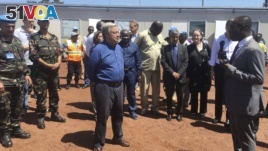Apr 15, 2018
The Central African Republic, or C.A.R., is one of the world's most fragile countries. In 2013, the Muslim Seleka alliance rebelled, seized power and removed then-President François Bozizé from office. But that was just the beginning of a bad situation, as the Seleka alliance went on a brutal rampage, continuing a campaign of killing, raping and pillaging non-Muslim villages. In response, the Anti-Balaka Christian militias formed, and began a similar campaign of terror against Muslim communities.
In an effort to protect the civilian population and stabilize the C.A.R., the United Nations Security Council deployed to the country a United Nations peacekeeping operation, MINUSCA.

U.N. Secretary-General Antonio Guterres, center, listens to U.N. staff in Bangui, Central African Republic. (File)
Zambia is a key partner in several UN peacekeeping efforts. Currently over 1,000 Zambian troops and police are deployed to four different peacekeeping missions, including to MINUSCA.
Right now, another battalion of Zambian troops is preparing to deploy to the Central African Republic peace keeping mission. As part of a larger, multi-year U.S. effort to build the capacity of these Zambian military personnel, the United States partnered with India recently to provide Zambian troops with a two-week course of medical field training.
U.S. Army medics partnered with two physicians from the Indian Army Medical Corps and worked with Zambian military medical personnel to improve their ability to respond to a range of medical situations, and to teach basic first responder skills to soldiers.
The two-week training course was funded by U.S. Department of State's Global Peace Operations Initiative, or GPOI, and coordinated through U.S. Africa Command. It was part of a long-term joint effort between India and the United States to cooperate in peacekeeping capacity building with third-country partners.
Peacekeeping missions are a critical tool for promoting reconciliation and post-conflict stabilization in some of the world's most troubled areas. The United Nations currently deploys nearly 100,000 uniformed peacekeepers to promote peace and security, while protecting civilians in conflict-affected countries. The United States, through peacekeeping operations and capacity building, supports the purpose and spirit of UN peacekeeping missions. Training events like this are not only integral to improving the readiness of troops for deployment, but also provide an opportunity for India and the United States to share their training techniques and experience with the wider peacekeeping community.